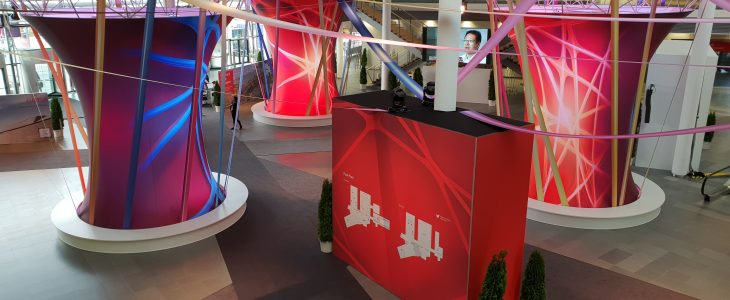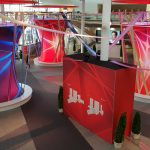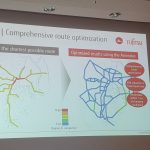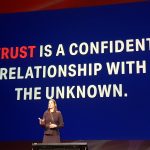
Last week I went to the Fujitsu Forum hosted in the International Congress Center in Munich. The conference was a good opportunity to talk with several industry experts about the latest technology and business trends. It was also good to catch up with recent developments in technologies that have been around for some time. There were several keynote speeches throughout the three days. The quality of the keynote speeches was very high – in terms of style and content. The additional breakout sessions could not hold up to this standard, but this is normal and did not surprise me. I noticed a changing focus at such conferences lately. A couple of years ago, especially the keynotes were very technology and marketing driven. Nowadays the employees, as a company’s biggest asset, moved to the center of most speeches.
Focus on Services and Co-Creation
Hardware got absolutely commoditized over the last ten years. Especially with moving to cloud providers, it really does not matter anymore which logo is on the hardware. This requires hardware manufacturers to think differently and focus on services on top or around the hardware. This itself is nothing new. What has changed is that these services are not provided individually, but get connected more and more. No company can provide everything on its own anymore. Therefore, it becomes crucial to build up partner ecosystems. Such partner ecosystem include customers, too. This is possible, because every company is a technology company to some extent today. Fujitsu calls creating solutions jointly with the customer ‘co-creation’.
Artificial Intelligence will enhance our Life
I really liked the positive outlook on the possibilities of artificial intelligence. Joseph Reger pointed out, European countries are far behind in this area currently. He strongly recommended, the principles of artificial intelligence should be made familiar to all people. I absolutely agree on that. There are lot of good online trainings available (e.g. on Coursera). Like other governments before, the German government will release an AI strategy during the Digital Summit beginning of December. There is a lot of attention on artificial intelligence and machine learning as one field. However, it is important to emphasize, that AI is not the solutions for everything. Sometimes challenges can be solved with traditional methods using much less computational power. One good demo on machine learning included fraud detection in supermarkets. This example seemed perfect for a dedicated post with a real-life experiment. Stay tuned…
Quantum inspired Computing with Digital Annealer
One topic that caught my attention upfront was the Digital Annealer. It is a quantum inspired computing solution to solve large-scale optimization problems. In very simple terms quantum annealing means finding the global minimum for a very large function with many local minima. Solving such challenges is not possible with traditional computers in reasonable time, if at all. In some cases quantum annealing offers 100 – 1.000 times better performance than traditional computing. I was impressed with the maturity of this technology. Several projects are already running at different customers. The quantum computing focused company 1QBiT from Canada presented a hugely successful project they completed with NatWest bank. The objective of this project was to optimize portfolios much quicker. Another project was presented by BMW. In this project PVC sealing performed by robots was optimized continuously in near real-time. That leads to higher volumes within the existing production line.
Quantum Computing – the Possibilities seem endless
The possibilities for this technology are huge and widespread. I could imagine, that large cities can make good use of it for optimizing their traffic including public transport continuously in real-time. Ideally, this could reduce traffic jams and waiting times at junctions. This again would lead to less emissions and therefore help the environment. Another field that instantly pops into my mind is last mile delivery. As outlined in my post on e-mobility, this is an area with large improvement needs. Similar to the BMW project, many other factories could benefit from optimizing automated production processes continuously. All experts agreed, that quantum computing will come. The question is just when?
Leadership sets Mindset for Innovation
One big topic at the Fujitsu Forum was how to get the innovative spirit into established companies. With vice presidents from Microsoft, Intel, NetApp and Fujitsu in a single panel discussion, it was really interesting to see that all of them agreed on several things. The leadership team needs to set the mindset for innovation. It is their task to bring the skills and passion of employees to life and use it for the company’s growth. Less hierarchy is crucial, because ideas do not flow well in hierarchies. I liked to hear that Microsoft dumped their rigid performance system in order to give people more freedom to try out things on their own. This is an idea I have outlined for a long time at several occasions.
Employees are a Company’s biggest Asset
“There is no shortage of ideas or projects, but a shortage of people!”
This might sound familiar to many companies. The shortage of IT experts is a worldwide phenomenon. Nowadays this causes huge problems, because people are key to the success of a company. This success is driven by innovators, collaborators and do-ers. So, how can a company keep their employees and attract new ones? One secret is focus on and empower people. Make your employees your biggest priority. Value input from your employees, because they know best how to improve the business. Some companies have created letter boxes for anonymous suggestions. Generally, a good idea, but some or better most of these suggestions need to be implemented. Otherwise employees will not feel taken seriously. In the leadership section I outline this topic in more detail.
Trust is essential for all Relationships
As trust is the core of my own leadership philosophy I clearly loved to see, that it became a core topic throughout the keynote sessions. When talking about the importance of co-creation and partner ecosystems, the speakers pointed out that trust-based partnerships are the key to success. Especially in partnerships between customers and suppliers it is important to trust each other as equals. After all, a contract can only support a partnership, but does not guarantee its success. The keynote speech about trust by Rachel Botsman moved me. Her definition of trust is to the point:
“Trust is a confident relationship with the unknown”
Rachel explained very well, why to her transparency does not imply more trust. In fact, more transparency makes trust obsolete. This idea was new to me, but it definitely makes sense. I was deeply impressed.







